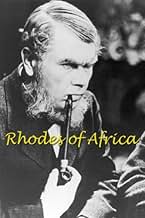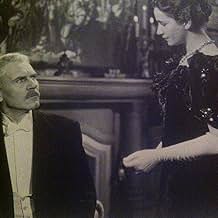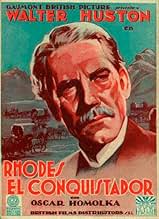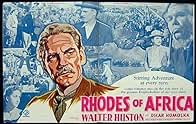Ajouter une intrigue dans votre langueThis rousing adventure film tells the true story of Cecil Rhodes, a diamond miner who helped found the South African colonies.This rousing adventure film tells the true story of Cecil Rhodes, a diamond miner who helped found the South African colonies.This rousing adventure film tells the true story of Cecil Rhodes, a diamond miner who helped found the South African colonies.
- Prix
- 2 victoires au total
Ndanisa Kumalo
- King Lobengula
- (as Ndanisa Kumalo of Matabeleland)
Felix Aylmer
- Johannesburg Diplomat
- (uncredited)
Diana de Vaux
- Sara
- (uncredited)
Victor Fairley
- Official Announcing 'Diamond Rush'
- (uncredited)
Ernest Jay
- Minor Role
- (uncredited)
Allan Jeayes
- Kruger's Minister
- (uncredited)
Sam Livesey
- Johannesburg Diplomat
- (uncredited)
Glennis Lorimer
- Cartwright's Fiancee
- (uncredited)
Avis en vedette
A remarkable film with remarkable performances by Huston infusing the character of Rhodes with a suggestion of madness, by Oscar Homolka as Kruger, a rare opportunity to see a fairly young Peggy Ashcroft and most of all the performance by Ndaniso Kumala as Lobengula. A remarkable man, a remarkable face, remarkable expressiveness. There's nothing else like this performance anywhere in movies. I was unable to find anything about him on line.
The location scenes, evidently shot in Rhodesia are stunning. One can only imagine what they would have been like in color.
The politics of the movie...don't pay too much attention. Rhodes was a complex character and according to present day morality a bad lot: a racist; and imperialist. But who he actually was, should have nothing whatever to do with the enjoyment of this unique and remarkable movie.
The location scenes, evidently shot in Rhodesia are stunning. One can only imagine what they would have been like in color.
The politics of the movie...don't pay too much attention. Rhodes was a complex character and according to present day morality a bad lot: a racist; and imperialist. But who he actually was, should have nothing whatever to do with the enjoyment of this unique and remarkable movie.
Anyone interested in the British film industry of the 1930s in general and this film specifically should read "The Unknown 1930s" edited by Jeffrey Richards and published by I.B.Tauris in 1998.In particular read Chapter 10 commencing on P201 entitled "Berthold Viertel At Gaumont British".Pages 212-215 give detail about the making of this film.It is rather funny in view of the parts that he played that just before filming was about to begin it was realised that Arliss did not resemble Rhodes.The part went to Walter Huston a friend of Mark Ostrer who was one of the major shareholders in Gaumont British.Oscar Homolka was cast because he had worked with Viertel before and shared the same agent.It is ironic that i am the first person from the UK to review this film,since it is unseen and forgotten here.The other reviewers seem to think that this is a Boys Own Adventure in the same vein as "The Drum" or "Gunga Din" which it is not.It is a biography.In fact the only set action piece is truncated half way through.It is an attempt to tell the story of the statesman Rhodes and at the same time extol the virtues of the Empire.it fails on both counts.It suffers the usual problems of such films of having too little time to tell too big a story.One dissolve covers a period of 10years.Rhodes was an aggressive colonist and treated the natives as children as is admitted by the film.Looking at the film in the 1930s these were perfectly acceptable sentiments.Today we can but wonder whether the ills of the continent were to an extent the responsibility of Rhodes.This film was part of a programme designed to woo American audiences.However in June 1937 the company announced that they had lost £98000 the previous year,a colossal amount,production was topped immediately and Lime Grove studios were shut down.This left Gainsborough to turn out Will Hay and Crazy Gang comedies.Balcon went to Ealing Studios via MGM Borehamwood and the rest is history.
90 minutes is hardly long enough time to tell the story of a most complex man. Cecil Rhodes was a combination robber baron and adventurer who amassed a fortune by being the last man standing in a war to control the diamond mining industry in South Africa. But Rhodes was a guy who dreamed big and wanted nothing less than control of sub Sahara Africa and if he had lived another two decades he might have had it.
Walter Huston was imported from America to play Rhodes who never married. So single minded and intense was he in pursuit of his goals he didn't make time or wasn't interested in a family. If he had done that the immense fortune that he acquired would never have gone to Rhodes scholarships for instance.
Obviously Gaumont British films wanted him to be a hero, but there just was too much bad in what he did to create his fortune to make Huston as Rhodes a sympathetic figure. His great adversary Paul Kruger leader of the Transvaal Republic of the Boers played here by Oscar Homolka comes off as more sympathetic. By accident Gaumont British did what UFA Studios in Nazi Germany did on purpose in their film Ohm Kruger where the same story is told from the Boer and hence anti-British point of view.
With an independent and majority black led South Africa now, the Cecil Rhodes if filmed today would be markedly different. Probably a whole lot better as well.
Walter Huston was imported from America to play Rhodes who never married. So single minded and intense was he in pursuit of his goals he didn't make time or wasn't interested in a family. If he had done that the immense fortune that he acquired would never have gone to Rhodes scholarships for instance.
Obviously Gaumont British films wanted him to be a hero, but there just was too much bad in what he did to create his fortune to make Huston as Rhodes a sympathetic figure. His great adversary Paul Kruger leader of the Transvaal Republic of the Boers played here by Oscar Homolka comes off as more sympathetic. By accident Gaumont British did what UFA Studios in Nazi Germany did on purpose in their film Ohm Kruger where the same story is told from the Boer and hence anti-British point of view.
With an independent and majority black led South Africa now, the Cecil Rhodes if filmed today would be markedly different. Probably a whole lot better as well.
CECIL RHODES played by Walter Houston in RHODES OF Africa (1936) is another of those odes too Empire. Most of these have to do with 'The British Empire' which "the Sun never sets on" and that includes this film. These films were very popular prior to World War II and every studio participated in making them. Though curious casting of a American actor for a then British hero. No doubt to give box office clout in the U.S.A. for this British made film.
Made at 'Shepherds Bush' the film purports to show CECIL RHODES career from his taking over of the diamond business, through empire building and too his death. His main opponent as shown is 'OHM' PAUL KRUGER played by Oskar Homolka, President of the South African Republic. Reading their histories neither would be too modern eyes likable or enlighten characters. Though in their era they had many admirers and wide spread popularity. It is best to read their histories then to depend upon this film for a informative view.
As 'Empire Films' go this a minor league entry. For a British film it has none of drive and spectacle that can be found in the films of Alexander KORDA. Movies like THE DRUM (1938) or THE FOUR FEATHERS (1939) are a far better watch. From the U.S.A. you should view Paramounts THE LIVES OF A BENGAL LANCER (1935), Warner Brothers THE CHARGE OF THE LIGHT BRIGADE (1936) or RKO's GUNGA DIN (1939). Even the minor league entry by Universal THE SUN NEVER SETS (1939) gives you better viewing value. The caveat is view these films for entertainment, for History go elsewhere.
Made at 'Shepherds Bush' the film purports to show CECIL RHODES career from his taking over of the diamond business, through empire building and too his death. His main opponent as shown is 'OHM' PAUL KRUGER played by Oskar Homolka, President of the South African Republic. Reading their histories neither would be too modern eyes likable or enlighten characters. Though in their era they had many admirers and wide spread popularity. It is best to read their histories then to depend upon this film for a informative view.
As 'Empire Films' go this a minor league entry. For a British film it has none of drive and spectacle that can be found in the films of Alexander KORDA. Movies like THE DRUM (1938) or THE FOUR FEATHERS (1939) are a far better watch. From the U.S.A. you should view Paramounts THE LIVES OF A BENGAL LANCER (1935), Warner Brothers THE CHARGE OF THE LIGHT BRIGADE (1936) or RKO's GUNGA DIN (1939). Even the minor league entry by Universal THE SUN NEVER SETS (1939) gives you better viewing value. The caveat is view these films for entertainment, for History go elsewhere.
Cecil Rhodes was a terrible person who exploited Africa. Anyone with enough time should read up on his life. He double-crossed friends and foe alike. Many of these old films were like so much propaganda films for the white man mentality of stealing and swindling to get rich while making the person look like some kind of hero. I guess you could make a film about Hitler or Saddam Hussein in a favourable light also.Cecil Rhodes thought Africa should belong to White men. He believed it was the white man's destiny to rule the world.Actually most movies of this age and most now don't reflect reality. Just what the people want to believe. Watch any movie you see with a grain of salt.
Le saviez-vous
- AnecdotesFinal film directed by Berthold Viertel.
- ConnexionsReferenced in Humour and Horror: Jonathan Rigby on Oscar Homolka (2024)
- Bandes originalesCome Down and Open the Door
(uncredited)
Written by Slade Murray and A. Sutherd
Meilleurs choix
Connectez-vous pour évaluer et surveiller les recommandations personnalisées
Détails
- Date de sortie
- Pays d’origine
- Langue
- Aussi connu sous le nom de
- Diamond Empire
- Lieux de tournage
- société de production
- Consultez plus de crédits d'entreprise sur IMDbPro
- Durée1 heure 30 minutes
- Couleur
- Mixage
- Rapport de forme
- 1.37 : 1
Contribuer à cette page
Suggérer une modification ou ajouter du contenu manquant

Lacune principale
By what name was Rhodes of Africa (1936) officially released in Canada in English?
Répondre



















